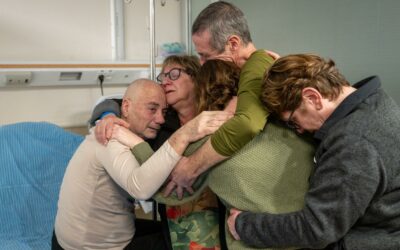Game-Changing Therapy: Sheba’s Collaboration with XRHealth for Brain Injuries
Since the outbreak of Operation Swords of Iron, many soldiers have been admitted into Sheba’s brain injury ward with severe wounds. Even a decade ago, their path to recovery would have been a lot more tumultuous than it is now. The current conflict has coincided with a period of innovation in terms of virtual reality and AI, and its expansion has not excluded the healthcare sector.
Sheba and XRHealth Innovation Collaboration
Sheba has recently collaborated with Israeli therapeutic VR and augmented reality startup XRHealth, in a winning effort to transform the way brain injuries are treated. Touring the ward today, one might see many patients wearing hi-tech goggles and holding game controllers, but they aren’t playing games. Ravid Segal, the chief technology officer of ARC Innovation’s XR hub, commented on the XRHealth system, saying, “We are not just playing with tech. We really understand it and know how and when to use it.”
This XRHealth VR system can be used at a patient’s home with proper remote medical supervision or at Sheba’s brain injury ward, and while it may appear that these injured soldiers are just playing video games, they’re actually making huge strides in improving their cognitive and motor abilities. Similar to progression in a real video game, as patients advance through stages, the challenge level intensifies, encouraging them to continually enhance their memory, attention span, and balance capabilities.

Innovative VR Approach to Brain Injury Rehabilitation
Occupational therapist Chen Ben Dan explains the importance of this virtual style, “This game-like approach creates more motivation for the patient and is especially good for young people who have grown up playing video games. I’ve noticed that the soldiers recovering in our department like it a lot.”
While treating brain damage might be the system’s primary focus, it is also utilized for occupational therapy in a variety of rehabilitation treatments. On the ward, technicians and volunteers can be seen engaging with patients, offering them the option to use the system to help them alleviate stress or pain by viewing tranquil scenes. This alternative initiative aims to assess its effectiveness and explore its potential application in treating post-traumatic stress disorder.
Maya Ehrlich, Director of XR Programs at ARC Innovation, noted that Sheba’s rehabilitation hospital received ten headsets from XRHealth since the conflict began. Hopefully, the system continues to guide patients on their road to recovery and revolutionizes brain injury treatment on a global scale.




